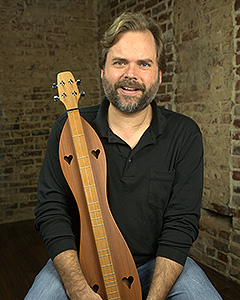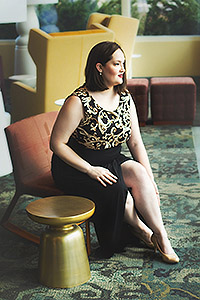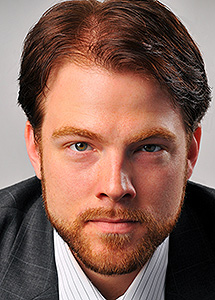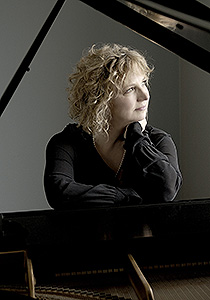Our stage will be full to the brim with orchestra musicians, soloists, and choirs to bring “Carmina Burana” to life. We journey from the first buds of Spring, to a raucous sing-a-long in a tavern, and finally to a slightly bawdy love story. We also welcome back Stephen Seifert to share the second concerto for Mountain Dulcimer by Conni Ellisor.

CARMINA BURANA
Broad Band of Light
A suite for mountain dulcimer and orchestra
Solo mountain dulcimer, Piccolo, flute, oboe, English horn, Clarinet in Bb, Bassoon, Horn in F (1 and 2), Trumpet in Bb, Trombone, Timpani, Percussion, Strings
I – Always Turning Toward
II – Unfrozen Still
III – Spin A Single Strand
IV – Nodding In The Wind
V – Rooted and Shaken
Timing: Approximately 22:10
My acquaintance with Steve Seifert is an old one; I first met him when his teacher grew ill and he stood in at literally the last minute to perform the premiere of my first dulcimer concerto, “Blackberry Winter,” in the fall of 1997. Though unaccustomed to the concert orchestra environment, his stage presence and skill made him a big success even at such a young age. He subsequently performed on the Warner Bros. recording of “Blackberry Winter” and has since performed the piece with many orchestras around the country. As he’s grown as a seasoned performer, so his extensive fan base teaching at festivals and via the internet has grown with him. This enabled the very creative commission of this piece – it is, so far as I know, the only fan-based commission of an orchestral piece in existence. People from all over donated to have a new piece written for Steve, and the Tucson Symphony was gracious enough to premiere it in 2012.
When we first met to discuss this piece, Steve was interested, above all else, in pushing the boundaries of what a dulcimer could do. A beautiful, tender instrument with a proud American folk tradition, the dulcimer is fairly primitive. It’s a form of diatonic zither with three strings, one usually used for melody and one or two for drone. But Steve has amassed technique far beyond the norm, and when he laughingly called himself a “musical bastard of sorts,” I knew exactly what he was asking for; he is influenced by so many types of music that he was interested in moving into styles and techniques unfamiliar and, yes, challenging enough as to be vaguely uncomfortable. That’s an area where a lot of artists thrive, including myself, and so this piece slowly began to form.
An ardent fan of Wendell Berry, I wanted this piece to be of the images and moods of an ever-modulating earth, and so I borrowed terms of a working Kentucky farm, where dulcimer is indeed the state instrument. In the first movement, “Turning Always Toward,” I suffused the dark earthy modal melody and odd-metered time of the American folk tune, “Kitchen Girl,” with a classical opening giving into the call from the woods. The second movement, “Unfrozen Still,” has to do with the use of space and time and allowing Steve to improvise in a new way over a bed of tonal orchestral instruments. Steve wanted to experiment playing in the Baroque style, much like the fully chromatic lute did in the Renaissance, and showcase his skills in the lightning-fast center movement, “Spin a Single Strand.” Always gravitating toward hymns, I found the traditional spiritual “Talk About A Soul” in my personal hymnbook and combined it with an ethereal group of simple triads to set off and finish the substantial fourth movement, “Nodding in the Wind.” Finally, the movement “Rooted and Shaken” takes the traditional fiddle and banjo tune “90 Degrees” to a rousing and relentless Celtic treatment until the hymn once again enters quietly in the winds and brass.
It is my hope that the piece moves in many moods and textures, much like the many different colors in a broad band of light. All the titles denote movement, and all the movements indicate reverence to mother earth and to the ultimate spiritual father of us all.
Carmina Burana
Carl Orff (1895 - 1982)
Carl Orff was a composer and music educator. He was born in Munich, spent all his working life there, and died there. While he produced a very large body of work for the theater and the concert hall, he was principally dedicated to the musical education of children. His research into music and movement and the mind of the child changed how music was taught in schools in Europe and abroad. As a composer he was trained in the Romantic and Classical styles, but around 1935 decided that those styles had "run their course" in his mind. He turned to simple melodies and primitive rhythms, incorporating them into his own compositions. In Carmina Burana he found the perfect vehicle for expression of his new style.
Orff first came upon Carmina Burana when its content was staged as a ballet in Frankfurt in 1937. He reported wrote to his music publisher saying, "You may now shred everything I have written in the past and that you have unfortunately published. With Carmina Burana my Collected Works begin."
During the 10th to 13th centuries groups of derelict poets, defrocked priests and drop-out students roamed throughout Europe. They were known as Goliards or Vagabonds. Unlike the polite poetry of the time, the Goliards spoke in earthy, explicit language. Their writings were cynical and irreverent and filled with references to their lifestyle, which included gambling, drinking, thievery, vices of all sorts, and religious criticism. A collection of these songs and poems, about 250 of them, was found in a monastery about 50 miles from Munich in 1803. They comprised lusty love songs, bawdy student songs, drinking songs, and short plays critical of the clergy, all written in Latin, French or German vernacular. These formed the basis for Carl Orff's greatest work, which he described as a "scenic cantata".
First performed at the Frankfurt Opera House in 1937, it begins and ends with a hymn to the goddess Fortuna, who is depicted as a giant wheel that carries its victims to great heights, then dashes them to the ground. The first section describes Spring, with rustic songs and dances. The second section is set in a tavern and is a description of the fun of drinking, gambling and eating. The third part, called The Court of Love, is a hedonistic and sensual celebration of the delights of love. The final section unifies the work, and serves to remind the listener that we are all at the mercy of Fortune.
At its American premiere in San Francisco in 1954, one reviewer stated that it was "one of the most vivid, picturesque, and richly tuneful choral pieces of modern times." It enjoyed enormous popularity in Western culture. At times it has had mystical power attributed to it, and even had cults form around it. The 13th century Goliards would have been amazed.
Beryl McHenry
About the Artists
- Bruce Anthony Kiesling, Conductor
- Stephen Seifert, Mountain Dulcimer
- Adrian College Choir, Phillip Clark, Director
- Chiaroscuro Men’s Chorus, Susan Matych-Hager, Director
- Carillon Women’s Chorale, Karen Nevins, Director
- Allison Prost, Soprano
- Nicholas Music, Tenor
- Jonathan Lasch, Baritone
 Stephen Seifert
Stephen Seifert
Stephen Seifert's teaching and playing have made him a favorite with dulcimer players all over the country since 1991. In that time, he's been a featured performer at close to a thousand dulcimer festivals and other music events including Kentucky Music Week in Bardstown, KY, Dulcimerville in Black Mountain, NC, the Augusta Heritage Center in Elkins, WV, the John C. Campbell Folk School in Brasstown, NC, the Ozark Folk Center in Mountain View, AR, Stringalong near Milwaukee, WI, the Walnut Valley Festival in Winfield, KS, The Tono American Music Festival, in Tono, Japan, and Halsway Manor near Crowcombe, Somerset, UK.
Stephen was dulcimer soloist with the Nashville Chamber Orchestra starting in 1996 and is featured on their Warner Classical recording of Conni Ellisor's Blackberry Winter, a concerto for mountain dulcimer and string orchestra written with consultation from the great David Schnaufer. The piece continues to be in regular rotation on many classical stations around the U.S. (The recording album is titled "Conversations in Silence" and can be sampled and purchased on iTunes.)
The world's foremost concert dulcimer player, Stephen has performed Blackberry Winter with the Charlotte Symphony Orchestra, the Tucson Symphony Orchestra, the Montpelier Chamber Orchestra, and many others. He's also performed the piece with renowned organist Wilma Jensen who arranged it for organ and dulcimer. His orchestral repertoire also includes a second concerto from Conni Ellisor titled Broad Band of Light, and two concertos from composer Mark Steighner.
Stephen was Adjunct Instructor of Mountain Dulcimer with David Schnaufer at Vanderbilt's Blair School of Music from 1997 to 2001. He also taught, performed, and recorded with Mr. Schnaufer as a duo throughout the country. Stephen has authored ten books, four CDs, and 16 instructional videos.
Most recently, he has been teaching hundreds of students around the world via dulcimerschool.com.
 Allison Prost
Allison Prost
Allison Prost is a current masters student studying with Professor Carmen Pelton at the University of Michigan. As a student, she frequently performs on art song recitals, instrumental chamber music concerts, and in U of M's main stage operas. Her most recent roles include La Contessa in Mozart's Le Nozze di Figaro and the leading role of Millicent Jordan in William Bolcom's Dinner at Eight (2017). As a community member, she enjoys staying involved in Ann Arbor and Metro Detroit's music communities by singing at a variety of churches in the area and participating as an active board member for the Detroit Women's Chorus.
As a professional musician, Allison often performs with University groups, student-led groups, and throughout the city of Ann Arbor. She is a sought-after section leader and substitutes for many local community choirs. Additionally, she teaches private voice lessons and gigs around the state for weddings, memorials, and other events. After graduating in 2019, she hopes to move forward in the opera world by participating in Young Artist Programs for regional opera theaters throughout the country.
 Nicholas Music
Nicholas Music
Acclaimed for his "superhuman expressive power and fine nuance" by Cleveland Classical, tenor Nicholas Music is a recent graduate of Oberlin College and Conservatory. He is currently pursuing a Master of Music degree in Voice Performance at the University of Michigan where he studies under Freda Herseth. During his time at Oberlin, he was a Rubin Scholar as part of the 2018 Marilyn Horne residency and performed several principle roles in Oberlin's mainstage opera productions including Peter Quint in The Turn of the Screw by Britten and le Mari in Poulenc’s Les mamelles de Tirésias. In 2018 he portrayed Boy Angel in Angel's Bone, the Pulitzer Prize-winning opera by Du Yun ’01, as well as singing the title role in The University of Michigan Opera Theatre’s production of Candide. The same year, he was a winner of the Voices of Canton Scholarship Competition. In January of this year he made his Carnegie debut with his alma mater as the tenor soloist in Stravinsky's Les Noces and performed the role of Oronte in Handel's Alcina in March with The University of Michigan.
 Jonathan Lasch
Jonathan Lasch
Jonathan Lasch has been described by critics as possessing a voice of "arresting color and heft," that is "smooth and flexible," "thrillingly resonant and firm-lined," a singer able to "balance a big, powerful sound with a light-handed facility with which he makes every note of the fast passagework perfectly clear," a performer who is a "master of the stage" and a "tour de force." Most recently, Mr. Lasch performed the roles of Sam in Trouble in Tahiti with Great Lakes Chamber Music Festival and Hannah Before in As One with Aepex Contemporary Performance at Kerrytown Concert Hall. Other recent roles include the title role in Le Nozze di Figaro for Princeton Festival, Leporello in Don Giovanni and Marco in A View from the Bridge with Michigan Opera Theater, Papageno in Die Zauberflöte with Master Players Concert Series at University of Delaware and Fargo Moorhead Opera, Sharpless in Madama Butterfly with Fargo Moorhead Opera, Scarpia in Tosca for Opera Saratoga’s Pasta and Puccini Night, Marcello in La bohème with Arbor Opera Theatre and Bar Harbor Music Festival, Ford in Falstaff with Aspen Opera Theater Center, Masetto in Don Giovanni with Green Mountain Opera Festival, and Captain Corcoran in H.M.S. Pinafore with Piedmont Opera.
An accomplished concert artist, Lasch has sung the premiere of Rene Clausen’s Passion at Minnesota Orchestra Hall, Mozart’s Requiem at Carnegie Hall with Manhattan Concert Productions; Händel’s Messiah with Houston Symphony, Milwaukee Symphony, and Calvin Orotorio Society, Beethoven's 9th Symphony with Adrian Symphony, Bach's Ich habe genug with Trinity Lutheran Church Foundation Series; and performances of Fauré's and Duruflé's Requiem, Henry Mallicone's Beatitude Mass, The Creation, The Five Mystical Songs, and Dover Beach with The Emerson String Quartet. He was also featured as a recitalist in Spain (Leon, Salamanca, Soria, and Bayona La Real). This season Mr. Lasch sang Handel's Messiah with the Toledo Symphony, performed Schubert's Schwanengesang several times in venues across Michigan, and will sing his first performance of Orff's Carmina Burana with the Adrian Symphony in May. In July Jonathan will return to one of his favorite Oratorio roles, the title role in Mendelssohn's Elijah, with the Conducting Academy led by Eugene Rogers in Ann Arbor, MI.
While earning an Artist Diploma in Opera at University of Cincinnati's College-Conservatory of Music, Jonathan's roles included the title role in Verdi's Falstaff, Melisso in Alcina, Shrike in the Midwest première of Lowell Liebermann's Miss Lonelyhearts, and Marcello in La bohème. During his Doctoral studies at the University of Michigan, then pre Dr. Lasch, reprised the title role in Falstaff and also sang his premiere of the title role in Don Giovanni. Mr. Lasch performed Ford in Falstaff and Escamillo in La tragédie de Carmen with Seattle Opera's Young Artist Program and Tarquinius in The Rape of Lucretia with Portland Opera. Jonathan was a Glimmerglass Opera Young American Artist for two summers where he performed Achilla in Giulio Cesare, and covered Scarpia in Tosca and Friedrich in Wagner's comic opera Das Liebesverbot.
Mr. Lasch was fortunate to learn from some of the best training programs in the United States, having participated in the Young Artist Programs at Glimmerglass Opera, Seattle Opera, Portland Opera, Chautauqua Opera, Connecticut Opera and the Aspen Opera Center. Dr. Lasch holds Bachelor and Master of Music degrees from The Hartt School at University of Hartford, an Artist Diploma in Opera from The University of Cincinnati College-Conservatory of Music, and a Doctorate of Musical Arts from The University of Michigan School of Music, Theatre, and Dance. Through these programs he was able to study with some of the foremost baritone pedagogues of today, including; William McGraw, Stephen Lusmann, Stephen King, Mark Oswald and Mark Schnaible, as well as ‘Breathing Specialist' Deb Birnbaum and renowned Wagnerian soprano, Jane Eaglen. Dr. Lasch has taught voice at Concordia College in Moorhead, MN, Adrian College, University of Michigan, and will return to Wayne State University in Detroit as Assistant Professor and Coordinator of Voice this coming school year. Jonathan enjoys living in Ferndale, Michigan with his wife and three kids, and is excited to start and grow the concert series and eventual training program 'Detroit Song Collective' with his wife and world-renowned soprano, Caitlin Lynch.
 Conni Ellisor, Composer
Conni Ellisor, Composer
"She can take materials out of diverse non-classical traditions and marry them with classical ideas and methods so that each tradition retains its distinctiveness within a whole greater than the sum of its parts."
Marcel Smith, The Nashville Scene
It is this marrying of traditions and ostensibly dissimilar genres that is the hallmark of Conni Ellisor's work. Her critically-acclaimed compositions are the beneficiaries of a brilliantly varied career. She has used her journey – formal training at Juilliard, early success in the classical world as a member of the Denver Symphony, concertmaster of the Boulder Philharmonic, first violin in the Athena Quartet (now the Colorado Quartet), and eventually as assistant concertmaster and soloist with the Nashville Chamber Orchestra, along with extensive work in the commercial world as a top-call session violinist and arranger – to inform her current musical statements.
Conni Ellisor's contributions to the orchestral repertoire include such uniquely American works as Blackberry Winter for mountain dulcimer and strings and Whiskey Before Breakfast – Partita for Bluegrass Band and Strings. Blackberry Winter has generated widespread NPR airplay and was featured on All Things Considered. Her long and productive association with the Nashville Chamber Orchestra resulted in the premieres of 11 of her works. Three were recorded for broadcast by NPR's Performance Today, and her "Conversations In Silence" became the title track on the orchestra's 1997 debut album on Warner Bros. NPR Senior Producer Benjamin Roe's comment that "the NCO truly is what's new in classical music" is a testament to Ellisor's groundbreaking contributions to the group's repertoire. Among the pieces commissioned by the NCO was Sea Without A Shore, written for orchestra, marimba and percussion and premiered by the NCO, Christopher Norton and world-renowned percussion ensemble NEXUS. Other of her works have been premiered and recorded by the St. Paul Chamber Orchestra, London Symphony, Nexus Chamber Orchestra, Denver Brass, Camelli Quartet, New York Treble Singers, Hamburg Radio Orchestra and the London Philharmonic.
A passionate and engaging educator as well, Ellisor has written multiple works for the Arlington (NY) High School Philharmonia Orchestra and recently completed a three-year residency with Stringendo, a nonprofit community strings program in upstate New York. The partnership has resulted in seven new works for varying levels of string orchestra.
Recent commissions and premieres include "Diaspora" by the Nashville Symphony (2011), her second concerto for mountain dulcimer and orchestra, "Broad Band of Light", by the Tucson Symphony (2012), "Tres Danzas De Vida" by the Arlington (NY) High School Philharmonia Orchestra (2013), "Fort of Shadows" by the Arlington High School Sinfonia Orchestra (2014), and "The Bass Whisperer", a concerto for electric bass written with and for 5x Grammy-winning bassist Victor L. Wooten and commissioned by the Nashville Symphony, the Colorado Symphony, and the Chicago Sinfonietta (2015/2016). She has also wrote and recorded the score for the SONY/Affirm film All Saints (2017) with composer/multi-instrumentalist (and husband) John Mock, through their production company, Drowsy Maggie Productions. Conni Ellisor's works are represented by LeDor Publishing.
Sources: www.ellisormusic.com | www.drowsymaggieproductions.com
Spotify Playlist
Concert repertoire and similar pieces
Concert Information
Buy Single Tickets Buy A Subscription
Ticket Prices
- Bruce Anthony Kiesling, Conductor
- Stephen Seifert, Mountain Dulcimer
- Adrian College Choir, Phillip Clark, Director
- Chiaroscuro Men's Chorus, Susan Matych-Hager, Director
- Carillon Women's Chorale, Karen Nevins, Director
- Allison Prost, Soprano
- Nicholas Music, Tenor
- Jonathan Lasch, Baritone
RESPIGHI: Fountains of Rome
ELLISOR: Broad Bands of Light
ORFF: Carmina Burana
Friday, 05/3/2019 8:00 PM
Dawson Auditorium, Adrian College
Classical Series Sponsors:


Concert Sponsor:


With Additional Support from:

Guest Artist Sponsor:
The Maurice & Dorothy Stubnitz Foundation
